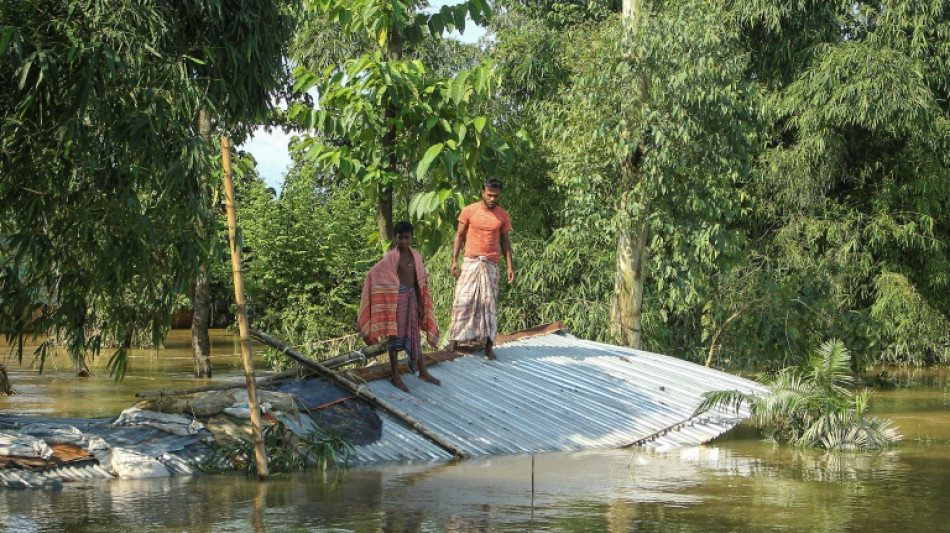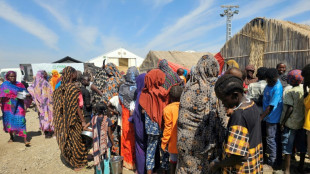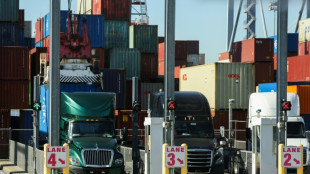
-
 Former Olympic champion Sharpe suffers heavy halfpipe crash
Former Olympic champion Sharpe suffers heavy halfpipe crash
-
Belarus says US failed to issue visas for 'Board of Peace' meeting

-
 Forest boss Pereira makes perfect start with Fenerbahce rout in Europa play-offs
Forest boss Pereira makes perfect start with Fenerbahce rout in Europa play-offs
-
Alcaraz fights back to book last four berth in Qatar

-
 England captain Itoje warns of 'corrosive' social media after abuse of Ireland's Edogbo
England captain Itoje warns of 'corrosive' social media after abuse of Ireland's Edogbo
-
War-weary Sudanese celebrate as Ramadan returns to Khartoum

-
 Townsend expects recalled Scotland duo to shine in Six Nations clash with Wales
Townsend expects recalled Scotland duo to shine in Six Nations clash with Wales
-
Peru's new president under fire for child sex comments

-
 UK king opens London fashion week despite brother's arrest
UK king opens London fashion week despite brother's arrest
-
Belarus frees opposition politician Statkevich

-
 Striking Argentine workers slow down Buenos Aires in protest over labor reforms
Striking Argentine workers slow down Buenos Aires in protest over labor reforms
-
Starlink loss a blow to Russian forces in Ukraine: experts

-
 UN's Sudan probe finds 'hallmarks of genocide' in El-Fasher
UN's Sudan probe finds 'hallmarks of genocide' in El-Fasher
-
Belarus frees opposition politician Statkevich: wife

-
 Rocket re-entry pollution measured in atmosphere for first time
Rocket re-entry pollution measured in atmosphere for first time
-
Airbus ready to build two new European fighters if countries want

-
 Canada makes push to attract skilled migrants, including for defence
Canada makes push to attract skilled migrants, including for defence
-
US threatens to leave IEA if net zero focus remains

-
 Walmart outlines big AI ambitions as it reports mixed results
Walmart outlines big AI ambitions as it reports mixed results
-
Trump kicks off his 'Board of Peace,' as war clouds loom on Iran

-
 UK pubs to stay open late if home nations reach World Cup knockouts
UK pubs to stay open late if home nations reach World Cup knockouts
-
TotalEnergies in high-stakes French trial over climate change

-
 Bosnia probes fascist salutes at Croatian singer's concert
Bosnia probes fascist salutes at Croatian singer's concert
-
US and Israel issue dire warnings to Iran alongside US military buildup

-
 British public cheer Andrew's arrest with a smile and relief
British public cheer Andrew's arrest with a smile and relief
-
Argentine workers go on strike to protest Milei's labor reforms

-
 Nakai targets Olympic skating upset as 'skimo' makes debut
Nakai targets Olympic skating upset as 'skimo' makes debut
-
What we know about ex-prince Andrew's friendship with Epstein

-
 US trade deficit in goods widens to new record in 2025
US trade deficit in goods widens to new record in 2025
-
Oil extends gains on US-Iran tensions, stocks retreat

-
 Williams 'on the back foot' after missing Barcelona: Albon
Williams 'on the back foot' after missing Barcelona: Albon
-
Real Madrid submit evidence to UEFA in Vinicius racism probe

-
 Olympics rev up Milan's renewal but locals fear price to pay
Olympics rev up Milan's renewal but locals fear price to pay
-
Cardona Coll, Fatton win Olympic-debuting ski mountaineering sprint golds

-
 MSF will keep operating in Gaza 'as long as we can': mission head
MSF will keep operating in Gaza 'as long as we can': mission head
-
Russian Filippov wins first medal at Milan-Cortina Games for individual neutral athletes

-
 Italian Milan takes sprint honours at UAE Tour
Italian Milan takes sprint honours at UAE Tour
-
Dozens killed in jihadist attacks in northwest Nigeria

-
 Zimbabwe unbeaten in T20 World Cup after six-wicket Sri Lanka win
Zimbabwe unbeaten in T20 World Cup after six-wicket Sri Lanka win
-
Postecoglou admits taking Nottingham Forest post a 'bad decision'

-
 Switzerland's Fatton wins women's ski mountaineering sprint on Olympic debut
Switzerland's Fatton wins women's ski mountaineering sprint on Olympic debut
-
Kinghorn, Van der Merwe return for Scotland against Six Nations strugglers Wales

-
 Repsol says could boost Venezuela oil output over 50% in 12 months
Repsol says could boost Venezuela oil output over 50% in 12 months
-
UN says Israeli actions raise 'ethnic cleansing' fears in West Bank, Gaza

-
 Arteta tells faltering leaders Arsenal to harness Wolves 'pain' against Spurs
Arteta tells faltering leaders Arsenal to harness Wolves 'pain' against Spurs
-
Crowley gets nod for Irish as Prendergast drops out

-
 Unbeaten Swiss to meet Great Britain in Olympic men's curling semis
Unbeaten Swiss to meet Great Britain in Olympic men's curling semis
-
UK police arrest ex-prince Andrew on suspicion of misconduct

-
 Oil extends gains on US-Iran tensions, Europe stocks slide
Oil extends gains on US-Iran tensions, Europe stocks slide
-
Former prince Andrew, a historic downfall


Nearly 1 in 4 globally at risk from severe flooding: study
Almost a quarter of the world's population are exposed to significant flood risks, according to new research published Tuesday, which warned those in poorer countries were more vulnerable.
Inundations from heavy rainfall and storm surges affect millions of people every year and cause billions of dollars of damage to homes, infrastructure and economies.
And the risks are rising as climate change causes more extreme precipitation and sea level rise, as exposed populations swell.
The new study, published in the journal Nature Communications, looked at global data on flood risks from the sea, rivers and rainfall, as well as population distribution and poverty estimates from the World Bank.
It found about 1.81 billion people -- or 23 percent of the people on the planet -- are directly exposed to floods of over 15 centimetres (six inches) in 1-in-100-year flooding.
"This would pose significant risks to lives and livelihoods, especially of vulnerable population groups," the study said.
Overall, nearly 90 percent of those exposed to inundations live in lower or middle income countries, according to the study.
It also concluded the number of people living in poverty and under severe flood risk is "substantially higher than previously thought".
Researchers found some $9.8 trillion of economic activity globally -- around 12 percent of the global gross domestic product in 2020 -- is located in areas exposed to severe flooding.
But they said concentrating simply on a monetary value could cause a bias of attention towards higher income countries and economic hubs.
"By accounting for the poverty levels of exposed populations, we show that low-income countries are disproportionately exposed to flood risks, while being more vulnerable to disastrous long-term impacts," said the study by Jun Rentschler of the World Bank and colleagues.
- Growing risks -
Overall, the study estimated most people exposed to flooding -- 1.24 billion -- are in South and East Asia, with China and India accounting for over a third of the global total.
Some 780 million people living on under $5.50 a day are at risk from once-in-a-hundred-year floods, it found.
The research provides "the first global estimates of the interaction between exposure to flood risk, and poverty", said Thomas McDermott, of the National University of Ireland Galway, in a linked commentary published in Nature Communications.
The authors said previous studies were often limited by geography or the type of flood risk assessed and had underestimated just how many people across the world are exposed.
"Climate change and risky urbanisation patterns are expected to further aggravate these risks in coming years," they added.
According to World Weather Attribution, a network of scientists tracing the impacts of climate change, global warming has made extreme rainfall more common and more intense across most of the world.
This has likely made flooding more severe in these areas, although scientists stress the other human factors also play a part, such as decisions about where homes and infrastructure are built.
This month, record floods in southern China displaced more than half a million people.
In Bangladesh, the Red Cross said Tuesday seven million people are still in "desperate" need of shelter and aid after some of the heaviest rains in a century swelled rivers to record levels and inundated rural villages.
M.A.Colin--AMWN


